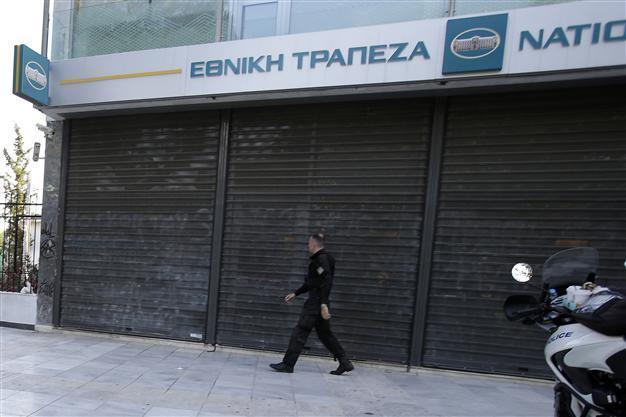Greece, EU duel over referendum as crisis deepens
ATHENS

AP photo
Greek and EU leaders have voiced contradicting messages about the upcoming referendum on the bailout package, as Greece struggled to adjust to shuttered banks, closed cash machines and a climate of rumors and conspiracy theories.
The latest breakdown in talks between Athens and its creditors has plunged the country deeper into crisis.
Prime Minister Alexis Tsipras, who blindsided creditors by calling a referendum on the austerity cuts in the aid package proposed by creditors, appeared on television on June 28 night to announce capital controls to prevent banks from collapsing.
Athens issued a decree to close banks until July 6, the day after a referendum on creditors’ bailout proposals, with a 60-euro ($65) limit on cashpoint withdrawals. The Athens stock market has meanwhile been shut until July 7.
“Any difficulties that may arise must be dealt with calmness. The more calm we are, the sooner we will get over this situation,” Tsipras said, adding Athens had again requested a “prolongation of the (bailout) program,” as quoted by Agence France-Presse.
In response to the referendum proposal, Greece’s eurozone partners refused to extend the country’s bailout program, which expires on June 30, and the European Central Bank capped its emergency support for the country’s banks.
European Commission chief Jean-Claude Juncker on June 29 urged voters in Greece to support a package of creditors’ reform proposals which they will vote on in a referendum.
“I will ask the Greek people to vote ‘Yes,’” he was quoted by AFP as saying, adding that one “should not commit suicide because one is afraid of death.”
Juncker said the vote was a “moment of truth” for Greece, whose existing assistance program ends on June 30.
German Chancellor Angela Merkel played down prospects of a breakthrough in the coming days, but said she stood ready to restart talks with Athens after the planned referendum.
Speaking on June 30 after a meeting of German party and parliamentary leaders in the Chancellery, Merkel criticized the government of Tsipras for failing to compromise with its eurozone partners after receiving what she called a “generous” offer, as reported by Reuters.
Economy Minister and Vice Chancellor Sigmar Gabriel, standing alongside Merkel, said that if Greeks voted against the bailout offer it would be a clear vote against staying in the euro.
French President Francois Hollande appealed to Tsipras to return to the negotiating table in the following hours on June 29 and Merkel said she was willing to talk to the 40-year-old Greek leader if he wanted.
“There are a few hours before the negotiation is closed for good,” Hollande said after a cabinet meeting on Greece.
European bank shares fell sharply on June 29. Top banks in Spain, France and Germany were down more than 6 percent as the risk of a spillover to banks in other peripheral eurozone countries spooked investors. Greece’s regional neighbors took measures to protect their banks and economies from the escalating financial crisis there and the possibility of a Greek exit from the euro.
After months of talks, Greece’s exasperated European partners have put the blame for the crisis squarely on Tsipras’s shoulders.
The creditors wanted Greece to cut pensions and raise taxes in ways that Tsipras has long argued would deepen one of the worst economic crises of modern times in a country where a quarter of the workforce is already unemployed.
As Tsipras announced the emergency measures late on Sunday, there were long queues outside ATMs and petrol stations as people raced to take out cash before it was too late. Lines of over a dozen people formed at ATMs when they reopened on June 29.
“I’ve got five euros in my pocket, I thought I would try my luck here for some money. The queues in my neighborhood were too long yesterday,” said plumber Yannis Kalaizakis, 58, outside an empty cash machine in central Athens on June 29, as quoted by Reuters.
